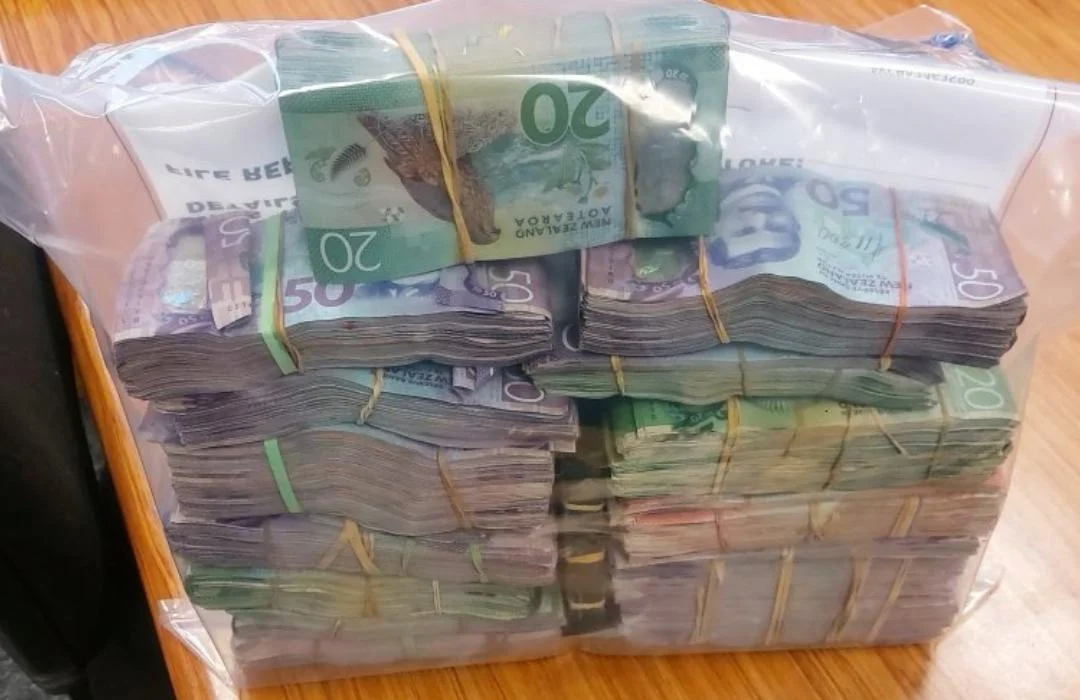$22,100 in cash, which a judge found was probably ’tainted money,’ is to be refunded to a man who claimed it was Lotto winnings.
A High Court judge in New Zealand has ordered the police to repay $22,100 (US$12,400) despite finding that, “by a slender margin,” it was most probably “tainted property”—the proceeds of drug dealing. He did so because to allow the Crown to retain it would cause the man “undue hardship,” and the law permits the courts to exercise discretion in such cases.
When police searched a Toyota, registered to the long-term partner of a man called Wii Taunoa, at a Napier property after its occupants had waved weapons while chasing another vehicle, they found a zip-lock bag containing what they believed was methamphetamine. The search took place in Taunoa’s driveway.
A subsequent search of a shed on the property unearthed several items all stored close to one another. They included a black toilet bag containing approximately 57 grams of methamphetamine and a set of digital scales; two cell phones, belonging to Taunoa and his partner; approximately 55 grams of cannabis; and three $50 notes and two cellphone boxes containing a total of $22,100. The cash was within one metre of the drugs.
The shed also contained police radio scanners and a large television screen linked to CCTV cameras located around the property.
An examination of Taunoa’s phone uncovered messages between him and a man with convictions for the supply of controlled drugs, including methamphetamine.
One such message asked Taunoa if he “want[s] any more my peps wanna know.”
Police say Taunoa replied: “Im allgood @ma bro@ the town is all loaded@ your mate, his ws short only 7 … .”
They interpreted this as Taunoa indicating he did not want any more methamphetamine, as Napier has an oversupply, and that he had received seven grams less than he paid for the last time he was supplied.
There were also other messages, which police allege were the two men discussing the poor quality of a recent batch of the drug.
Charges Later Dropped
Police initially charged Taunoa with possession of methamphetamine for supply and possession of cannabis for supply. However, these charges did not proceed to trial as it wasn’t possible to exclude the possibility that the drugs and cash belonged to the other occupants of the address, who also had access to the garage.
In the end, no one was charged because ownership of the drugs could not be proved, but police kept the money under the Criminal Proceeds (Recovery) Act, which requires they ask a court for an order to be forfeited.
Taumona, however, had an alternative explanation for the facts: he knew nothing about the methamphetamine, and the money was part of approximately $30,000 given to him by his sister, Karena Taunoa, who had won over $13 million in Lotto. The suspicious messages, he claimed, were sent by other people using his phone.
In court, his sister confirmed that she had indeed given him around $30,000 in the years after her 2016 win.
However, police countered that Taunoa’s bank statements show close to that amount being deposited electronically and spent by the end of 2017. They said the cash had not come from his sister.
Gifts Part of Māori Culture: Lawyer
His lawyer admitted that the proximity of the cash to a drug stash was “not a great start” for him but that there was no tangible evidence linking the drugs and the money.
She argued that people who “give koha (gifts), money, or advances to their loved ones should not be discriminated against simply because their culture does not traditionally use legal formalities or keep records of the exchange” and that Māori tikanga (traditional customs and values) should influence the court’s decision.
Justice Jason McHerron found that the large amount of circumstantial evidence had convinced him, albeit “by a slender margin,” that the $22,100 was the proceeds of crime.
Weighed against that, Taunoa had no drug-related convictions—apart from for the possession of cannabis seeds in 1987—and no convictions at all after 2003.
Despite finding that police had established grounds for a forfeiture order to be made, granting one would affect Taunoa in ways that were “grossly disproportionate.”
His complex health problems meant Taunoa’s needs “go further and are out of the ordinary,” McHerron said in his judgement, and “the seizure and forfeiture of the $22,100 is reasonably likely to cause (and is causing) undue hardship for him.”
The judge declined to make the order in favour of the police, meaning they must refund him the money.

